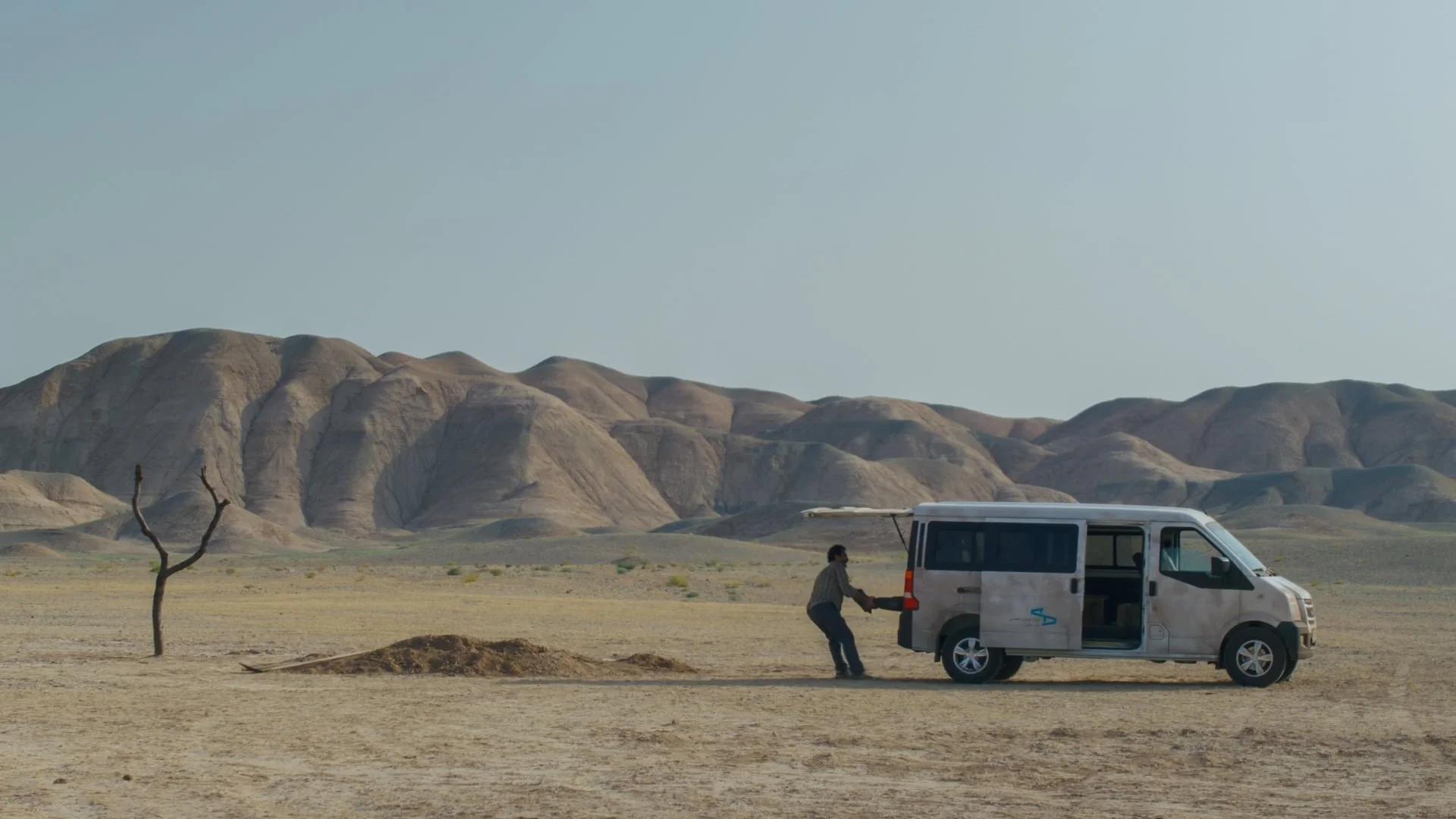IT WAS JUST AN ACCIDENT
Directing: A-
Acting: B+
Writing: A
Cinematography: B
Editing: A
I wonder if I’m over here on Weirdo Island, thinking about Alfred Hitchcock’s Psycho while watching Jafar Panahi’s It Was Just an Accident? There is almost no thematic connection between these two films, although Psycho features a serial killer and It Was Just an Accident features a near-murder. What the two films have in common are their unusual narrative structure, particularly an opening, extended sequence leading us to think one person is the main character, only to find out it’s actually another person. Indeed, the first character is even attacked by the second.
We are first introduced to a nuclear family, driving through the night: a seemingly loving husband and father (Ebrahim Azizi) with his wife in the passenger seat and pop music-loving young daughter in the back seat. The cinematography is fascinating here, as it appears to be a simple mounting of the camera on the dashboard, and a lot happens in a single shot—including other cars passing, in one case with several barking dogs chasing in the other direction. Within moments, we hear the bump of an animal being hit, and the man stops the car, gets out, and investigates. The camera never shows the animal—this technique is repeated later in the film in a pointed way—but we do see bits of the man’s shadow, a view of city lights on the hills in the distance behind him, as he drags the animal out of the street. He returns to the car, and the little girl’s chipper attitude has soured. “You killed it,” she says. And the mother tries to console her. It was just an accident.
Shortly thereafter, this family’s car breaks down, and the man asks for help from men in a nearby home. This is where the perspective suddenly shifts, to another man, Vahid (Vahid Mobasseri), who is hiding on the second level of the home, out of sight. Panache’s camera only ever sticks with Vahid for the rest of the film, and it’s quite a lot time before we have any idea why. This includes Vahid following the man back to his home, and following him the next day to the place his car is towed to for repair. In his own van, Vahid creeps up on him in the street, opens the passenger door hard against him, and then knocks him out with a shovel.
All of this is essentially the first act. What follows is an unsettling sort of road trip story, Vahid eventually gathering several more characters: Shiva (Mariam Afshari), a woman working as a wedding photographer; Goli and Ali (Hadis Pakbaten and Majid Panahi), the engaged couple getting their pictures taken; and Hamid (Mohamad Ali Elyashmehr), Shiva’s former partner. what is gradually revealed is that nearly all of these people, with the one exception of Ali, were once arrested by the Iranian regime, and tortured for months by a man with an identifiable limp due to a prosthetic leg named Eghbal—and they are all varying levels of convinced that the man we met at the start of the film is this man.
It may seem that I have revealed a lot of detail about this film, but believe it or not, that is all mostly the setup. It does take a good deal of time to get through, but it’s how we get here: the way Panahi, who also wrote the script, explores the psychological effects of a deeply oppressive and authoritarian regime. The man who might be Eghbal easily plants a seed of doubt in Vahid’s mind as to whether he’s got the right guy, which is why he goes on an odyssey of sorts, gathering acquaintances who had also been arrested in the hopes that they can confirm the man’s identity, even though they were all blindfolded the entire time they were held captive and never actually saw him. They heard him, they felt him, they smelled him. For some, the familiarity they find is not quite convincing enough. For others, it’s triggering to the point of instantaneous rage. For all of them, it’s maddening.
Eventually all of them are traveling the city in Vahid’s van, maybe-Eghbal’s drugged, bound and unconscious body locked in a trunk that is curiously the perfect size for a grown man. There’s a number of exterior, urban shots of this cast with said van, and I often wondered how this film was made. Much like the similarly excellent The Seed of the Sacred Fig, directed and written by Mohammad Rasoulof and opened earlier this year, this was filmed in secret in Iran. Indeed, Panahi and Rasoulof are just two of many artists who have been arrested in the past for speaking out against Iran’s authoritarian regime.
And the roving band of characters in It Was Just an Accident have many of their own conversations about it. They talk and they argue, they debate and they yell—often about the tension between desire for vengeance and what it means to become just as violent and cruel as your oppressors. Many of their exchanges bring to mind parallel points of view here at home in the United States. This is less a reflection of cross-cultural commentary than of universal tensions among different societies. We eventually find nearly all these characters pushed to the emotional brink in one way or another, and It Was Just an Accident proves sneakily unsettling in the end. Panahi often holds a shot for a very long time, always with purpose, and especially in the very last shot of the film, which calls into question whether Vahid did the right thing in the end, or indeed what the point of any of it was. This makes It Was Just an Accident sound pretty bleak, and I suppose it is. It also paints a vivid picture of what authoritarianism does to the regular people subjected to it.
Overall: A-

